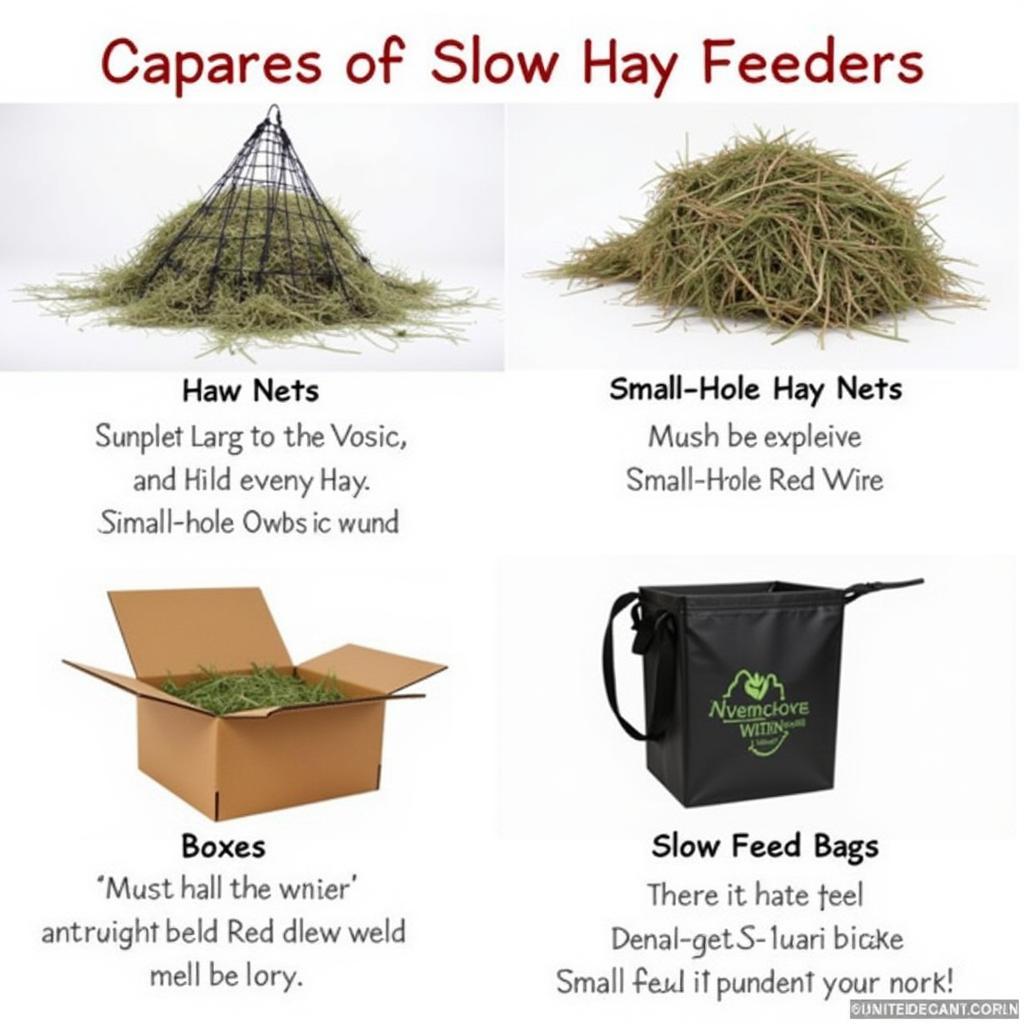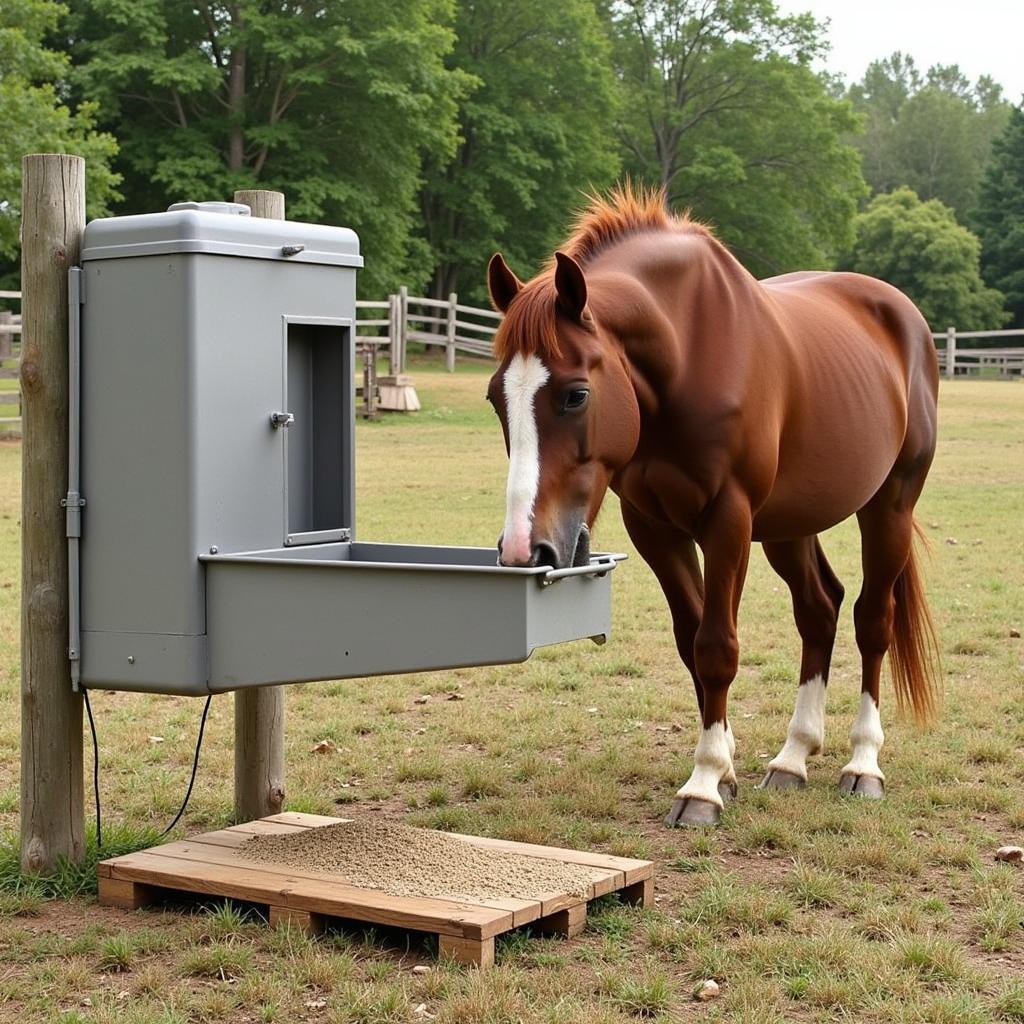Slow Hay Feeders For Horses are essential tools for promoting equine digestive health and preventing overeating. They mimic natural grazing behavior, reducing boredom and minimizing waste. By slowing down consumption, these feeders help horses maintain a healthy weight and avoid digestive issues.
Why Use Slow Hay Feeders for Horses?
Horses are designed to graze for up to 16 hours a day. In domestic settings, this constant access to forage is often impossible. This is where slow hay feeders come in. They provide a way to extend feeding time, keeping your horse occupied and reducing the risk of digestive upsets associated with long periods without food. feeding horses once a day can be detrimental to their health, and slow feeders can be a great solution. A key benefit of slow feeders is the reduction in hay waste. By containing the hay and preventing it from being trampled and soiled, you’ll save money and ensure your horse consumes clean, palatable forage.
How Do Slow Hay Feeders Improve Digestive Health?
Slow hay feeders promote smaller, more frequent meals, which is closer to a horse’s natural grazing pattern. This helps maintain a steady flow of saliva production, crucial for buffering stomach acid and preventing ulcers. Consistent chewing also promotes better digestion and nutrient absorption. Are slow hay feeders worth the investment? Absolutely! The long-term health benefits far outweigh the initial cost.
Choosing the Right Slow Hay Feeder
Selecting the right slow hay feeder for your horse depends on several factors, including your horse’s size, feeding habits, and living environment. There are various types available, from small-hole hay nets to elaborate feeder designs. Do you have a miniature horse? A miniature horse hay feeder will be perfectly sized. For those looking for space-saving options, hanging horse feeders can be a good solution.
 Different Types of Slow Hay Feeders
Different Types of Slow Hay Feeders
Types of Slow Hay Feeders
- Hay Nets: nibble net for horses are a popular and affordable option. Choose a net with small holes to maximize feeding time. Ensure the net is securely fastened and high enough to prevent entanglement.
- Hay Bags: Similar to nets, these are often made of durable fabric and offer varying hole sizes.
- Hay Boxes: These provide a more stable feeding platform, reducing hay wastage.
- Slow Feed Balls: These can be a fun and engaging way to provide hay, especially for playful horses.
“A well-chosen slow feeder can significantly improve a horse’s well-being,” says Dr. Emily Carter, Equine Nutritionist. “It’s a simple change that can make a big difference in their digestive health and overall happiness.”
Tips for Using Slow Hay Feeders
Introducing a slow hay feeder should be a gradual process. Start by offering a small amount of hay in the feeder alongside their regular feeding method. This allows your horse to adjust to the new feeding style. Ensure the feeder is placed in a safe and accessible location.
 Horse Using a Slow Feeder
Horse Using a Slow Feeder
Making the Transition to Slow Feeders
- Gradual Introduction: Don’t switch completely to a slow feeder overnight.
- Monitor Intake: Ensure your horse is consuming enough hay.
- Cleanliness: Regularly clean the feeder to prevent mold and bacteria growth.
“Slow feeders are a game-changer for horse owners,” shares John Miller, experienced horse trainer. “They mimic natural grazing behavior and keep horses occupied, which is especially important for horses prone to boredom or anxiety.”
Conclusion
Slow hay feeders for horses are an invaluable tool for promoting equine health and well-being. By mimicking natural grazing patterns, they contribute to better digestion, reduce boredom, and minimize hay waste. Investing in a feeder for horses that encourages slow feeding is a wise decision for any horse owner.
FAQ
- How do I choose the right size slow feeder?
- Can slow feeders be used for all types of hay?
- How often should I clean a slow feeder?
- Are slow feeders suitable for horses with dental problems?
- What are the benefits of using a slow feeder for a horse prone to colic?
- Can I use a slow feeder for other livestock?
- Where can I buy a slow hay feeder?
Common Scenarios & Questions
-
Scenario: My horse is losing weight on a slow feeder.
- Question: Is my horse getting enough hay from the slow feeder? How can I ensure he’s consuming adequate forage?
-
Scenario: My horse is getting frustrated with the slow feeder.
- Question: Is the feeder too restrictive? Should I try a different type of slow feeder?
Further Reading and Resources
Check out these other helpful articles on our website:
- How to choose the right hay for your horse
- Understanding equine digestive health
- Managing boredom in horses
For support, contact us: Phone: 0772127271, Email: [email protected] or visit us at: QGM2+WX2, Vị Trung, Vị Thuỷ, Hậu Giang, Việt Nam. We have a 24/7 customer service team.